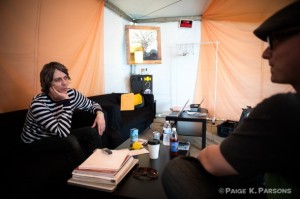Q&A: Flaming Lips’ Wayne Coyne and Steven Drozd discuss ‘The Terror’
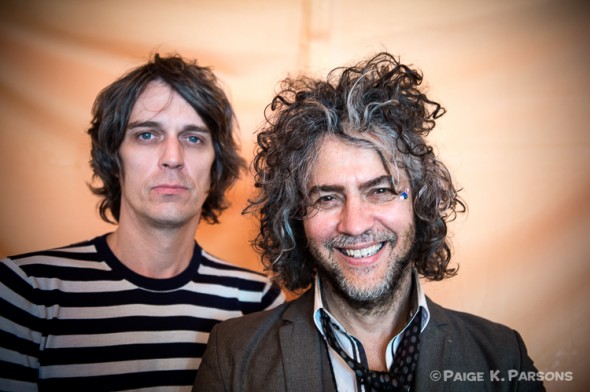
Steven Drozd and Wayne Coyne of The Flaming Lips interviewed at BottleRock 2013 Napa Valley in Napa. Photos courtesy: Paige K. Parsons.
The Flaming Lips frontman Wayne Coyne and multi-instrumentalist/music arranger Steven Drozd won’t mince their words. Their new album, The Terror, is their darkest offering yet. “Dark” isn’t the right word for it, but they haven’t thought of an appropriate replacement yet, says Drozd, prior to the Lips’ set at BottleRock Napa Valley. The Lips have made alterations to their well-known stage show to fit the mood of the new album. Yet, at the same time, the gloom that hangs over the music is just one of many sides for the band. Yes, Coyne went through a separation during The Terror’s creation. Yes, Drozd had a brief relapse into a drug addiction. “There is a story there,” Drozd says. “I think that adds to people’s perception or makes it seem heavy or more important.”
Yet at the same time they were making the album, the Lips were writing a happy, uplifting song for a Hyundai commercial (used as a Super Bowl ad), and experiencing a wide array of emotions. “Most people that I know that are interesting artists – they’re not one-dimensional,” Coyne says. “They don’t walk around and see everything as being gray and black and make gray and black music. They’re weirdos, and they don’t know who they are. They’re expressive, and they’re doing things, and they’re experiencing a lot of things. That’s why they want to make music.”
Coyne and Drozd joined The Bay Bridged for a one-on-two interview that went passed the allotted time, and ranged in conversation from Drozd’s background as a drummer in his father’s polka band, to the Flaming Lips “selling out” and much more. It concluded only after the arrival of The Smiths’ bassist Andy Rourke, throwing this writer for a loop. Here’s a sampling.
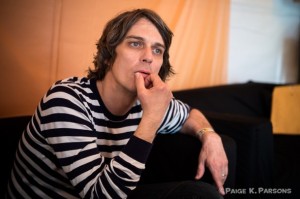
Steven Drozd and Wayne Coyne of The Flaming Lips interviewed at BottleRock 2013 Napa Valley in Napa.
I assume you get asked all the time about your background in polka drumming. You got that from your father’s side?
Steven Drozd: My dad started playing music when he was, like, 13. He started playing clarinet. By the time he was 16 he picked up saxophone because he heard Bill Haley (and the Comets; the first successful rock group with white musicians) in 1957. He wanted to play rock and roll. So he was a professional musician, but he always played in this German and Czech polka group outside of Houston. It was the summer of 1980, so I was 10, going on 11. This polka group; their drummer was kind of this wild dude. They just couldn’t count on (him). He didn’t show up for a gig, so my dad called the house and told my stepmother to load up my drum set. He took me to the VFW hall where they were playing and I started playing with them.
Did you have to learn any of the cultural stuff behind that?
Drozd: When I first started playing, I was about 7. It was like KISS and Aerosmith and all the stuff back in the 1970s a kid would want to play on drums. At the same time, my dad was like, “You’ve gotta learn the polka and the waltz beats, and the country 4/4 and the shuffle.” He would make me practice that stuff even if I didn’t want to. So when it came time, and they needed a drummer, they called me up, I went down there, and that was it.
I have a high school friend who’s in a family polka band.
Drozd: Like a few generations, right? An interesting thing is there’s a lot of families like that.
They dress up. They go to fairs, and they dance as well as play instruments. Did you see a lot of that?
Drozd: I did growing up, when I was a kid. I don’t anymore. Most of my family has either passed away or moved on. My dad still lives in LaGrange, Texas, but he’s kind of sick, so he doesn’t play anymore. Up until I was about 15 or 16, I thought it was really exciting, and I loved it. After a while, I got really sick of it. (laughs). You’ve got to figure every Friday and Saturday…it would be this thing where I was just this kid, 12, 13, 14 years old, hanging around with a bunch of 30, 40, 50-year-old drunks. After a couple of years, I didn’t want to do it anymore. So my dad and I kind of had a falling out about it. I wanted to go play my own music. He couldn’t understand writing your own music and trying to make it by yourself.
How did you go from ‘70s rock to polka and to the Lips?
Drozd: I’d been kicking around for a few years in Houston and Austin. Then I moved to Norman, Oklahoma. By the time I’d met the Lips guys, I’d been playing in indie rock bands for a few years. The Lips were one of my favorite bands at that time. By the time I met them, I was a pretty hardcore fan. It didn’t feel like a big stylistic jump for me.
By that point, they’d been around for a few years.
Drozd: Wayne’s eight years older than me, Michael (Ivins, the Lips’ bassist) seven, so it was almost like they were my older brothers. I was just this kid, 22 years old, and I was dying to play. It took me a couple of years to get over the fact that I had joined the Flaming Lips. The first couple of years, I was on this high.
Do you approach playing a large audience show differently from a small audience show?
Drozd: We try not to. We don’t in the way we play the music. The stage set-up is always going to be different because some places aren’t big enough to hold all the stuff we have. Take Bimbo’s (where the Lips played their previous San Francisco show, during Noise Pop 2012). As much as we love Bimbo’s, we can’t do our full show there because it’s just too small. But we still want to play there because the energy of the place is just incredible.
And the hamster ball can only go so far before it starts bouncing off the walls.
Drozd: Actually, I have to say that’s one thing that’s never determined the hamster ball is the size of a club. It’s like a place in Aspen, Colorado; it’s the size of this dressing room (30-feet by 30-feet). It is a deciding factor of how much lights and video stuff we bring.
You still have the giant confetti cannons, though.
Drozd: We usually do have the giant confetti cannons, yeah. But Wayne’s not doing the hamster ball anymore. He stopped doing that. We stopped doing the dancers on stage, we stopped doing the hamster ball, we stopped doing the giant balloons.
Is that a stylistic…?
Drozd: Stylistic change. We wondered if people were receiving it as a sort of a Flaming Lips caricature out there on the road. With our new record, we decided to go a different way.
The new record is also a lot darker and less colorful.
Drozd: Oh, this is funny. We just recently started doing black confetti out of the confetti cannons to go with the music from the new record. It looks fucking crazy. It’s like, “What is that, bugs or something?” So we’re still trying to keep it a big show, but it’s a little darker and weirder. Not weirder – it was always kind of weird. It’s not as happy (and) celebratory. Our long-time fans, I think they expect us to change somewhat. So we’re trying to walk that fine line of “How much do we change and how much do we keep doing the same kind of trick?”
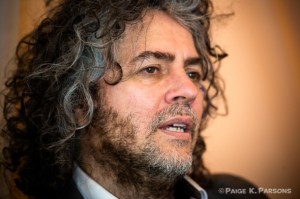
Steven Drozd and Wayne Coyne of The Flaming Lips interviewed at BottleRock 2013 Napa Valley in Napa.
Has the response changed much to you guys since doing the Super Bowl and Wayne’s Virgin Mobile ad? It’s very mainstream.
Drozd: That’s very mainstream, yeah. The Virgin ad, I see it all the time. Wayne is recognized all the time. The rest of us will kind of be recognized, but it’s more usually the hardcore, nerdy kind of fans. Wayne looks like a famous guy. I think some of our fans get turned off by the fact that we did a Super Bowl commercial. But we’re, like, “We were on Beverly Hills 90210 back in 1995.” It’s not like we’re just now selling out. We’ve always been doing stuff like that. Soundtracks, commercials, we did a Dell commercial a few years ago. One of our songs is in a Ford commercial. The people that appreciate everything we do, the way they look at it is, “If we do this stuff, it gives us more money to do the weird stuff that we want to do, which is actually true.”
So it’s not like you did it because you had to. It’s not exactly that you did it because you wanted to. But you had to do it in order to get all the stuff you wanted.
Drozd: That’s a good way to put it, yeah. We don’t do things we don’t want to do. That’s kind of the way it is, which is fortunate. Our relationship with Warner Brothers is, they don’t give us a whole lot of money to make our record, but then they don’t expect us to sell a million records. They say make the record you want.
It gives you creative freedom. The commercials are definitely working. Four months ago, I could tell my friends who are casual music fans I was speaking to you, and maybe one-third would know the Flaming Lips. Now the majority would.
Drozd: Is that right? They don’t normally say it’s the Flaming Lips, do they?
If the song is catchy enough, people will look it up online.
Drozd: They’ll put it together. Aha. The thing about the Hyundai commercial: We put that song as a bonus track on the new record. I was kind of against it because that song is like this little sunshiney, happy, summertime pop song. But the rest of The Terror is … If you like the Super Bowl song, you’re probably not going to like this. I’ve seen a couple of reviews on iTunes. I admit that I read our reviews on iTunes. I’m sorry. You’ll see someone who’s never heard us before: “I bought the record because of that Super Bowl song, which I kind of liked, but this is just a bunch of shit.” (laughs). Which to me is awesome. I’m like, “All right! We got someone to buy the record based on the commercial!” And they’re just like, “What is this noise?” You’ve gotta offend somebody. If you’re not offending some part of the population, you’re getting too mellow.
You guys make some very cerebral music. For fans who don’t necessarily get the complete message, are you OK with a guttural reaction?
Drozd: Oh, yeah. I wouldn’t expect everybody to get it. Sometimes you can get a feeling without understanding anything. I hope that comes through. I feel like that’s part of my job, to try to create an emotion from the music, and the words just drive whatever it is home.
(Coyne makes his way over from the snack table to the couch, from which he’d been listening in.)
Drozd: We’ve mostly covered everything.
Coyne: I see.
We actually were supposed to speak by phone when you were at SXSW, but your manager lost track of your publicist.
Drozd: “The eternal struggle.”
But this is much better.
Coyne: Because now you have us all to yourself.
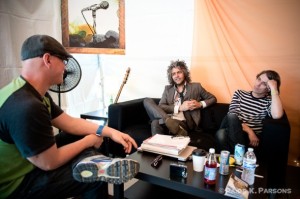
Steven Drozd and Wayne Coyne of The Flaming Lips interviewed at BottleRock 2013 Napa Valley in Napa.
What triggered the darker mood on this album in the first place?
Coyne: I don’t think it’s that.
Drozd: I wish there was a better word than darker, but I can’t think of it.
Melancholy?
Drozd: Well, all of our stuff is melancholy.
Coyne: We weren’t thinking we were going to make a record. And then Steven had these couple of compositions. And then we just pushed it a little bit further and said, “Let’s see if we could come up with a few more.” At the moment that we had three or four of them going, we thought, “Wouldn’t it be really great if we had this record?” Around that time, or maybe even a little bit earlier, I took that picture that’s on the cover. For me, sometimes all it takes is a couple of things; just to be like, “It looks like this; it could sound like this.” And before you know it, you’re creating something. As it went along, it felt like, Well, I guess if Steven’s doing it, and I’m doing it, then it’s a Flaming Lips thing.” It just became that. People forget that we did the Super Bowl commercial at the same time. We’ve done a lot of things in this same time that doesn’t feel like the stuff on the record. We were just not putting any of that stuff on it. I don’t think it was as specific as, “We feel a certain kind of way, so we have to make a certain kind of music.” I don’t think anyone makes music like that. I think it must seem like that. Moods are like home states of mind. You could be thinking 10 different things in 10 minutes. It’s not like you think one thing, and nothing else gets thought of.
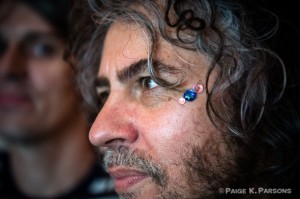
Steven Drozd and Wayne Coyne of The Flaming Lips interviewed at BottleRock 2013 Napa Valley in Napa.
I spoke with the guys in The National a few years ago, and of course they’re known for downbeat, sad music.
Drozd: They’re serious dudes, yeah.
And they told me that sometimes, when they’re writing that depressing stuff, they’re happy.
Coyne: I don’t think depressing music is necessarily depressing.
Drozd: Even the Joy Division guys talk about working on atmosphere or whatever, and going down to the pub and having beers and laughing about some football game, so it’s not that black and white.
Coyne: It’s not necessarily (that) these feelings make this music that feels this way. I don’t think it’s like that.
And as for the thematic elements, I’ve read about the life events that each of you had when you were recording The Terror. (Coyne separated after a longtime relationship and Drozd had a drug addictions relapse). Right now I’m getting the same feeling that I got when I interviewed LL Cool J last week and had to ask him about “Accidental Racist” just because everyone else was.
Drozd: (Laughs).
It could be a bad analogy. Sorry.
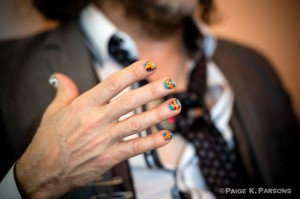
Steven Drozd and Wayne Coyne of The Flaming Lips interviewed at BottleRock 2013 Napa Valley in Napa.
Drozd: For me, it’s like whatever that thing was that I was going through that we say is the jumping off point – in some ways, it was really over by the time we got really deep into making the record.
Coyne: I agree. And you don’t want to make it seem like it has nothing to do with it. But you could almost make any kind of music being in any kind of state of mind. It doesn’t really…
Drozd: It doesn’t have to correlate at all.
Coyne: We think that they do, but I don’t think any art is really like that. I think when it happens like that, it’s a coincidence.
Follow Roman Gokhman at Twitter.com/RomiTheWriter.

